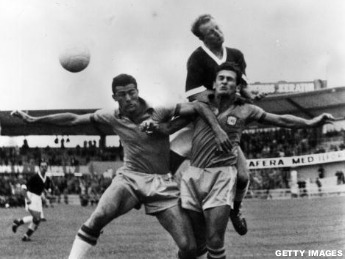
An autopsy of a former Brazilian soccer star has found that the man suffered from chronic traumatic encephalopathy, the brain condition found in more than 40 deceased NFL veterans.
Bellini captained Brazil to a World Cup victory in 1958, and his legend in the country lives on today -- a statue in Rio de Janeiro honors him as one of the country's finest athletes. Bellini died this past March at 83, and it was assumed at the time that complications from Alzheimer's had been the primary cause of his death.
Researchers examining his brain, however, now say Bellini's brain suggests an advanced case of CTE.
CTE has been linked to repeated and traumatic strikes to the head, which are most common in football. Soccer, however, has the second-highest concussion rate among the major sports. Until this point, only one other former soccer player had been diagnosed with CTE.
Bellini's confirmed case could be a wake-up call to the soccer world. As we reported this past summer, former U.S. star Brandi Chastain has been trying to raise awareness of the concussion risks that come with heading a soccer ball.

Chastain has encouraged youth leagues to ban headers among players younger than 14 years old, and has said she already enforces that rule for her own children.
Soccer has been slow to develop a response to those concussion risks, even as awareness of the dangers of brain trauma increase among the public. FIFA, the world's governing soccer body, is only now seeking to implement a defined in-game protocol for head injuries.
In this particular case, Bellini isn't likely to be the sole example. But since CTE can only be diagnosed posthumously, it could be years before we get a better understanding of just how widespread the damage from concussions in soccer might be.
Furthermore, Bellini's story is unique is that it puts CTE in an international sports context. Until now, no international sports figures had been diagnosed with CTE, and since almost all sports-related CTE cases stemmed from American-style football, the condition wasn't seen as a threat in other countries.
Bellini's diagnosis changes that. And, while he lived to the age of 83, The New York Times reports that the condition had been affecting him for decades. His wife told the paper that he had suffered from memory loss for the past 20 years, and his condition worsened eight years ago.
And one time, according to the paper, the soccer star "hired a taxi and asked the driver to take him to the home base of a São Paulo soccer team he had played for decades earlier, because he believed he needed to go to training."




